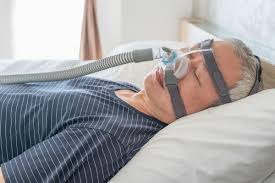Study Links Obstructive Sleep Apnea to Increased Dementia Risk, Especially in Women

A new study conducted by researchers at Michigan Medicine suggests that obstructive sleep apnea (OSA), a common yet often underdiagnosed sleep disorder, significantly contributes to the development of dementia among adults, particularly women. The investigation analyzed survey and cognitive screening data from over 18,500 adults to explore the impact of known or suspected OSA on dementia risk.
Obstructive sleep apnea is characterized by episodes of disrupted or restricted breathing during sleep, and many individuals may be unaware that they have this condition. The findings indicate that adults aged 50 and older with known OSA or its symptoms face a higher likelihood of exhibiting signs or receiving a dementia diagnosis in the years to come. While the overall increase in dementia diagnoses was modest—never exceeding 5%—the association remained statistically significant even after accounting for other risk factors such as race and education.
The study revealed that at every age level, women with known or suspected sleep apnea were diagnosed with dementia more frequently than men. In fact, while the rate of dementia diagnoses among men decreased with age, it increased significantly for women. The results have been published in the journal *SLEEP Advances*.
"Our findings offer new insight into the role of a treatable sleep disorder on long-term cognitive health at the population level for both women and men," explained Dr. Tiffany J. Braley, the study's first author and a neurologist at the University of Michigan.
The reasons behind the sex-specific differences in dementia diagnosis related to sleep apnea remain unclear. However, researchers speculate that women with moderate sleep apnea may face a heightened risk of cardiovascular disease and are more susceptible to insomnia, both of which adversely affect cognitive function. "As estrogen levels decline during menopause, women may experience memory, sleep, and mood changes that can lead to cognitive decline. Sleep apnea becomes more prevalent post-menopause but is often underdiagnosed," added co-author Dr. Galit Levi Dunietz.
While approximately six million Americans have received an official diagnosis of sleep apnea, it is estimated that around 30 million may be affected by the disorder. A recent report from a Lancet Commission identified several modifiable risk factors contributing to nearly 40% of global dementia cases. Although sleep was not listed as an official risk factor, the commission acknowledged a potential association between sleep apnea and dementia, suggesting that screening questions for dementia should be considered for individuals with sleep disorders.
The study emphasizes the importance of early diagnosis and treatment of obstructive sleep apnea, as untreated cases may lead to cognitive impairment through inflammatory changes in the brain. Dr. Braley noted, "These potential harms highlight the critical need for clinicians and patients to recognize the relationship between untreated sleep apnea and cognitive decline."
The study utilized existing data from the Health and Retirement Study, a representative survey of Americans aged 50 and older. However, the researchers caution that this observational study design cannot definitively establish causation. Co-author Dr. Ronald D. Chervin remarked, "Proving that sleep apnea directly causes dementia would likely require a randomized trial comparing the effects of sleep apnea treatment against non-treatment over many years. In the absence of such trials, our analyses may provide valuable insights for the time being."
The findings serve as a compelling call for further exploration into how sleep disorders, particularly in women, can influence cognitive health, especially in the context of aging.
Story Source:
Materials provided by Michigan Medicine - University of Michigan. The original text of this story is licensed under a Creative Commons License. Note: Content may be edited for style and length.
Journal Reference:
- Tiffany J Braley, Xiru Lyu, Galit Levi Dunietz, Paul C Schulz, Riley Bove, Ronald D Chervin, Henry L Paulson, Kerby Shedden. Sex-specific dementia risk in known or suspected obstructive sleep apnea: A 10-year longitudinal population-based study. Sleep Advances, 2024; DOI: 10.1093/sleepadvances/zpae077

0 Comments